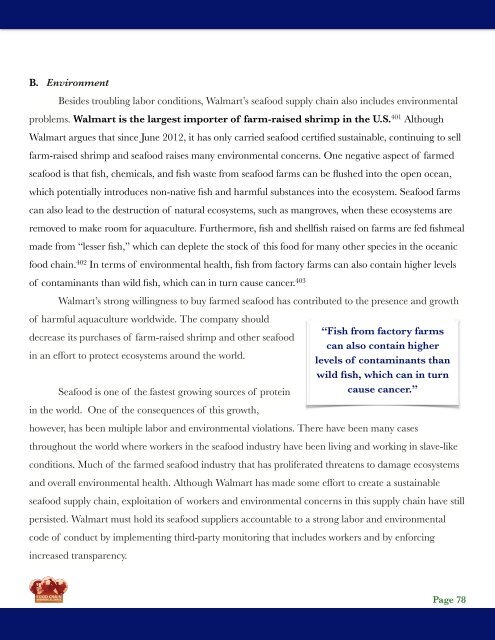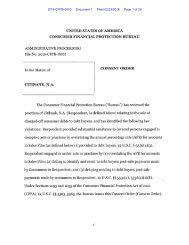Walmart-at-the-Crossroads-FINAL-06.04.15
Walmart-at-the-Crossroads-FINAL-06.04.15
Walmart-at-the-Crossroads-FINAL-06.04.15
Create successful ePaper yourself
Turn your PDF publications into a flip-book with our unique Google optimized e-Paper software.
B. Environment<br />
Besides troubling labor conditions, <strong>Walmart</strong>’s seafood supply chain also includes environmental<br />
problems. <strong>Walmart</strong> is <strong>the</strong> largest importer of farm-raised shrimp in <strong>the</strong> U.S.<br />
401<br />
Although<br />
<strong>Walmart</strong> argues th<strong>at</strong> since June 2012, it has only carried seafood certified sustainable, continuing to sell<br />
farm-raised shrimp and seafood raises many environmental concerns. One neg<strong>at</strong>ive aspect of farmed<br />
seafood is th<strong>at</strong> fish, chemicals, and fish waste from seafood farms can be flushed into <strong>the</strong> open ocean,<br />
which potentially introduces non-n<strong>at</strong>ive fish and harmful substances into <strong>the</strong> ecosystem. Seafood farms<br />
can also lead to <strong>the</strong> destruction of n<strong>at</strong>ural ecosystems, such as mangroves, when <strong>the</strong>se ecosystems are<br />
removed to make room for aquaculture. Fur<strong>the</strong>rmore, fish and shellfish raised on farms are fed fishmeal<br />
made from “lesser fish,” which can deplete <strong>the</strong> stock of this food for many o<strong>the</strong>r species in <strong>the</strong> oceanic<br />
food chain.<br />
402<br />
In terms of environmental health, fish from factory farms can also contain higher levels<br />
of contaminants than wild fish, which can in turn cause cancer.<br />
403<br />
<strong>Walmart</strong>’s strong willingness to buy farmed seafood has contributed to <strong>the</strong> presence and growth<br />
of harmful aquaculture worldwide. The company should<br />
decrease its purchases of farm-raised shrimp and o<strong>the</strong>r seafood<br />
in an effort to protect ecosystems around <strong>the</strong> world.<br />
Seafood is one of <strong>the</strong> fastest growing sources of protein<br />
in <strong>the</strong> world. One of <strong>the</strong> consequences of this growth,<br />
however, has been multiple labor and environmental viol<strong>at</strong>ions. There have been many cases<br />
throughout <strong>the</strong> world where workers in <strong>the</strong> seafood industry have been living and working in slave-like<br />
conditions. Much of <strong>the</strong> farmed seafood industry th<strong>at</strong> has prolifer<strong>at</strong>ed thre<strong>at</strong>ens to damage ecosystems<br />
and overall environmental health. Although <strong>Walmart</strong> has made some effort to cre<strong>at</strong>e a sustainable<br />
seafood supply chain, exploit<strong>at</strong>ion of workers and environmental concerns in this supply chain have still<br />
persisted. <strong>Walmart</strong> must hold its seafood suppliers accountable to a strong labor and environmental<br />
code of conduct by implementing third-party monitoring th<strong>at</strong> includes workers and by enforcing<br />
increased transparency.<br />
“Fish from factory farms<br />
can also contain higher<br />
levels of contaminants than<br />
wild fish, which can in turn<br />
cause cancer.”<br />
Page !78



